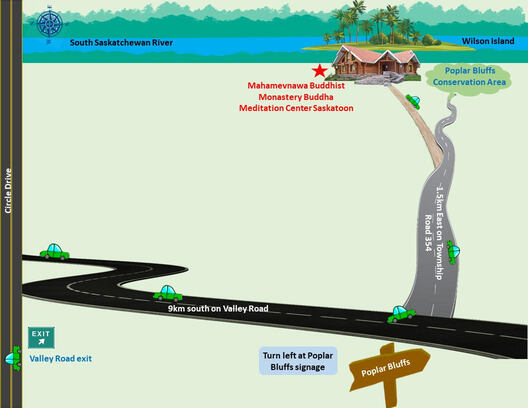Kesaputtiya Sutta ( Kalama Sutta ) - The Discourse to Kalamas in Kesaputta
Namo Tassa Bhagavato Arahato Samma Sambuddhassa !
Homage to the Blessed One, the Worthy One, the Supremely Enlightened One !
Homage to the Blessed One, the Worthy One, the Supremely Enlightened One !
The Kalamas of Kesaputta approached the Blessed One said to the Blessed One: "Bhante, there are some ascetics and brahmins who come to Kesaputta. They explain and elucidate their own doctrines, but disparage, denigrate, deride, and denounce the doctrines of others. But then some other ascetics and brahmins come to Kesaputta, and they too explain and elucidate their own doctrines, but disparage, denigrate, deride, and denounce the doctrines of others. We are perplexed and in doubt, Bhante, as to which of these good ascetics speak truth and which speak falsehood."
"It is fitting for you to be perplexed, Kalamas, fitting for you to be in doubt. Doubt has arisen in you about a perplexing matter. Come, Kalamas, do not go by oral tradition, by lineage of teaching, by hearsay, by a collection of scriptures, by logical reasoning, by inferential reasoning, by reasoned cogitation, by the acceptance of a view after pondering it, by the seeming competence of a speaker, or because you think:‘The ascetic is our guru.’But when, Kalamas, you know for yourselves:‘These things are unwholesome; these things are blameworthy; these things are censured by the wise; these things, if accepted and undertaken, lead to harm and suffering,’ then you should abandon them.
"What do you think, Kalamas ? When greed ... / hatred ... / delusion arises in a person, is it for his welfare or for his harm ?" - "For his harm, Bhante."
"Kalamas, a greedy person, overcome by greed, with mind obsessed by it..., / a person who is full of hate, overcome by hatred, with mind obsessed by it..., / a person who is deluded, overcome by delusion, with mind obsessed by it;... destroys life, takes what is not given, transgresses with another's wife, and speaks falsehood; and he encourages others to do likewise. Will that lead to his harm and suffering for a long time?" - "Yes, Bhante."
"What do you think, Kalamas? Are these things wholesome or unwholesome?" – "Unwholesome, Bhante." – "Blameworthy or blameless?" – "Blameworthy, Bhante." – "Censured or praised by the wise?" – "Censured by the wise, Bhante." – "Accepted and undertaken, do they lead to harm and suffering or not, or how do you take it?" – "Accepted and undertaken, these things lead to harm and suffering. So we take it."
"Come, Kalamas, do not go by oral tradition..., But when you know for yourselves: ‘These things are wholesome; these things are blameless; these things are praised by the wise; these things, if accepted and undertaken, lead to welfare and happiness,’ then you should live in accordance with them.
"What do you think, Kalamas? When non-greed, non-hatred, non-delusion arise in a person, is it for his welfare or for his harm?" - "For his welfare, Bhante." "Kalamas, a person without greed, hatred, delution not overcome by them, his mind not obsessed by them, does not destroy life, take what is not given, transgress with another's wife, or speak falsehood; nor does he encourage others to do likewise. Will that lead to his welfare and happiness for a long time?" - "Yes, Bhante."
Kalamas? Are these things wholesome or unwholesome?"–"Wholesome, Bhante." –"Blameworthy or blameless?"-"Blameless, Bhante."–"Censured or praised by the wise ?" –"Praised by the wise, Bhante."–"Accepted and undertaken, do they lead to welfare and happiness or not, or how do you take it ?" "Accepted and undertaken, these things lead to welfare and happiness. So we take it."
"Then, Kalamas, that noble disciple, who is thus devoid of longing, devoid of ill will, unconfused, clearly comprehending, ever mindful, dwells pervading one quarter with a mind imbued with loving-kindness / compassion / altruistic joy / equanimity, likewise the second quarter, the third quarter, and the fourth quarter. Thus above, below, across, and everywhere, and to all as to himself, he dwells pervading the entire world with a mind imbued with equanimity, vast, exalted, measureless, without enmity, without ill will.
"This noble disciple, Kalamas, whose mind is in this way without enmity, without ill will, undefiled, and pure, has won four assurances in this very life.
"The first assurance he has won is this:‘If there is another world, and if there is the fruit and result of good and bad deeds, it is possible that with the breakup of the body, after death, I will be reborn in a good destination, in a heavenly world.’"The second assurance he has won is this: ‘If there is no other world, and there is no fruit and result of good and bad deeds, still right here, in this very life, I maintain myself in happiness, without enmity and ill will, free of trouble. "The third assurance he has won is this: ‘Suppose evil comes to one who does evil. Then, when I have no evil intentions toward anyone, how can suffering afflict me, since I do no evil deed ?’ "The fourth assurance he has won is this: ‘Suppose evil does not come to one who does evil. Then right here I see myself purified in both respects.’
"So it is, Blessed One! So it is, Fortunate One! This noble disciple whose mind is in this way without enmity, without ill will, undefiled, and pure, has won four assurances in this very life. This noble disciple, Bhante, whose mind is in this way without enmity, without ill will, undefiled, and pure, has won these four assurances in this very life. Excellent, Bhante! Just as a man were to set upright what was overturned, to reveal what was hidden, to show the way to one who was lost, or to carry a lamp into the dark, so that those with eyes could see forms, in the same way the Dharma has been made clear in many ways by the Blessed One. We go for refuge to the Blessed One, to the Dharma, and to the Sangha of bhikkhus. Let the Blessed One consider us lay followers who from today have gone for refuge for life."
"It is fitting for you to be perplexed, Kalamas, fitting for you to be in doubt. Doubt has arisen in you about a perplexing matter. Come, Kalamas, do not go by oral tradition, by lineage of teaching, by hearsay, by a collection of scriptures, by logical reasoning, by inferential reasoning, by reasoned cogitation, by the acceptance of a view after pondering it, by the seeming competence of a speaker, or because you think:‘The ascetic is our guru.’But when, Kalamas, you know for yourselves:‘These things are unwholesome; these things are blameworthy; these things are censured by the wise; these things, if accepted and undertaken, lead to harm and suffering,’ then you should abandon them.
"What do you think, Kalamas ? When greed ... / hatred ... / delusion arises in a person, is it for his welfare or for his harm ?" - "For his harm, Bhante."
"Kalamas, a greedy person, overcome by greed, with mind obsessed by it..., / a person who is full of hate, overcome by hatred, with mind obsessed by it..., / a person who is deluded, overcome by delusion, with mind obsessed by it;... destroys life, takes what is not given, transgresses with another's wife, and speaks falsehood; and he encourages others to do likewise. Will that lead to his harm and suffering for a long time?" - "Yes, Bhante."
"What do you think, Kalamas? Are these things wholesome or unwholesome?" – "Unwholesome, Bhante." – "Blameworthy or blameless?" – "Blameworthy, Bhante." – "Censured or praised by the wise?" – "Censured by the wise, Bhante." – "Accepted and undertaken, do they lead to harm and suffering or not, or how do you take it?" – "Accepted and undertaken, these things lead to harm and suffering. So we take it."
"Come, Kalamas, do not go by oral tradition..., But when you know for yourselves: ‘These things are wholesome; these things are blameless; these things are praised by the wise; these things, if accepted and undertaken, lead to welfare and happiness,’ then you should live in accordance with them.
"What do you think, Kalamas? When non-greed, non-hatred, non-delusion arise in a person, is it for his welfare or for his harm?" - "For his welfare, Bhante." "Kalamas, a person without greed, hatred, delution not overcome by them, his mind not obsessed by them, does not destroy life, take what is not given, transgress with another's wife, or speak falsehood; nor does he encourage others to do likewise. Will that lead to his welfare and happiness for a long time?" - "Yes, Bhante."
Kalamas? Are these things wholesome or unwholesome?"–"Wholesome, Bhante." –"Blameworthy or blameless?"-"Blameless, Bhante."–"Censured or praised by the wise ?" –"Praised by the wise, Bhante."–"Accepted and undertaken, do they lead to welfare and happiness or not, or how do you take it ?" "Accepted and undertaken, these things lead to welfare and happiness. So we take it."
"Then, Kalamas, that noble disciple, who is thus devoid of longing, devoid of ill will, unconfused, clearly comprehending, ever mindful, dwells pervading one quarter with a mind imbued with loving-kindness / compassion / altruistic joy / equanimity, likewise the second quarter, the third quarter, and the fourth quarter. Thus above, below, across, and everywhere, and to all as to himself, he dwells pervading the entire world with a mind imbued with equanimity, vast, exalted, measureless, without enmity, without ill will.
"This noble disciple, Kalamas, whose mind is in this way without enmity, without ill will, undefiled, and pure, has won four assurances in this very life.
"The first assurance he has won is this:‘If there is another world, and if there is the fruit and result of good and bad deeds, it is possible that with the breakup of the body, after death, I will be reborn in a good destination, in a heavenly world.’"The second assurance he has won is this: ‘If there is no other world, and there is no fruit and result of good and bad deeds, still right here, in this very life, I maintain myself in happiness, without enmity and ill will, free of trouble. "The third assurance he has won is this: ‘Suppose evil comes to one who does evil. Then, when I have no evil intentions toward anyone, how can suffering afflict me, since I do no evil deed ?’ "The fourth assurance he has won is this: ‘Suppose evil does not come to one who does evil. Then right here I see myself purified in both respects.’
"So it is, Blessed One! So it is, Fortunate One! This noble disciple whose mind is in this way without enmity, without ill will, undefiled, and pure, has won four assurances in this very life. This noble disciple, Bhante, whose mind is in this way without enmity, without ill will, undefiled, and pure, has won these four assurances in this very life. Excellent, Bhante! Just as a man were to set upright what was overturned, to reveal what was hidden, to show the way to one who was lost, or to carry a lamp into the dark, so that those with eyes could see forms, in the same way the Dharma has been made clear in many ways by the Blessed One. We go for refuge to the Blessed One, to the Dharma, and to the Sangha of bhikkhus. Let the Blessed One consider us lay followers who from today have gone for refuge for life."
Sādhu ! Sādhu !! Sādhu !!!
( The Numarical Discourses of the Buddha, ( 279 p.) English Translation by Ven. Bhikkhu Bodhi, Wisdom Publications )
( The Numarical Discourses of the Buddha, ( 279 p.) English Translation by Ven. Bhikkhu Bodhi, Wisdom Publications )


